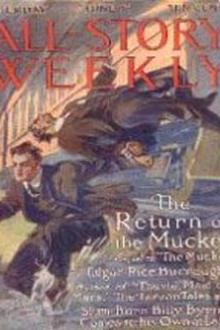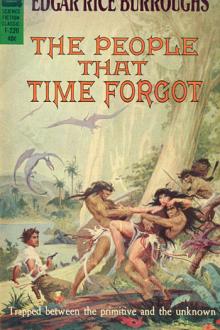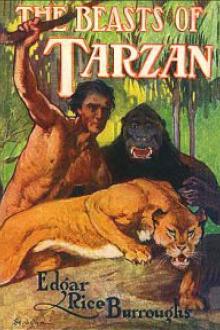The Return of the Mucker, Edgar Rice Burroughs [best affordable ebook reader txt] 📗

- Author: Edgar Rice Burroughs
- Performer: -
Book online «The Return of the Mucker, Edgar Rice Burroughs [best affordable ebook reader txt] 📗». Author Edgar Rice Burroughs
This new thing surged through him and over him with all the blind, brutal, compelling force of a mighty tidal wave. It battered down and swept away the frail barriers of his new-found gentleness. Again he was the Mucker—hating the artificial wall of social caste which separated him from this girl; but now he was ready to climb the wall, or, better still, to batter it down with his huge fists. But the time was not yet— first he must get Barbara to a place of safety.
On and on they went. The night grew cold. Far ahead there sounded the occasional pop of a rifle. Billy wondered what it could mean and as they approached the ranch and he discovered that it came from that direction he hastened their steps to even greater speed than before.
“Somebody’s shootin’ up the ranch,” he volunteered. “Wonder who it could be.”
“Suppose it is your friend and general?” asked the girl.
Billy made no reply. They reached the river and as Billy knew not where the fords lay he plunged in at the point at which the water first barred their progress and dragging the girl after him, plowed bull-like for the opposite shore. Where the water was above his depth he swam while Barbara clung to his shoulders. Thus they made the passage quickly and safely.
Billy stopped long enough to shake the water out of his carbine, which the girl had carried across, and then forged ahead toward the ranchhouse from which the sounds of battle came now in increased volume.
And at the ranchhouse “hell was popping.” The moment Bridge realized that some of the attackers had reached the veranda he called the surviving Mexican and the Chinaman to follow him to the lower floor where they might stand a better chance to repel this new attack. Mr. Harding he persuaded to remain upstairs.
Outside a dozen men were battering to force an entrance. Already one panel had splintered, and as Bridge entered the room he could see the figures of the bandits through the hole they had made. Raising his rifle he fired through the aperture. There was a scream as one of the attackers dropped; but the others only increased their efforts, their oaths, and their threats of vengeance.
The three defenders poured a few rounds through the sagging door, then Bridge noted that the Chinaman ceased firing.
“What’s the matter?” he asked.
“Allee gonee,” replied Sing, pointing to his ammunition belt.
At the same instant the Mexican threw down his carbine and rushed for a window on the opposite side of the room. His ammunition was exhausted and with it had departed his courage. Flight seemed the only course remaining. Bridge made no effort to stop him. He would have been glad to fly, too; but he could not leave Anthony Harding, and he was sure that the older man would prove unequal to any sustained flight on foot.
“You better go, too, Sing,” he said to the Chinaman, placing another bullet through the door; “there’s nothing more that you can do, and it may be that they are all on this side now—I think they are. You fellows have fought splendidly. Wish I could give you something more substantial than thanks; but that’s all I have now and shortly Pesita won’t even leave me that much.”
“Allee light,” replied Sing cheerfully, and a second later he was clambering through the window in the wake of the loyal Mexican.
And then the door crashed in and half a dozen troopers followed by Pesita himself burst into the room.
Bridge was standing at the foot of the stairs, his carbine clubbed, for he had just spent his last bullet. He knew that he must die; but he was determined to make them purchase his life as dearly as he could, and to die in defense of Anthony Harding, the father of the girl he loved, even though hopelessly.
Pesita saw from the American’s attitude that he had no more ammunition. He struck up the carbine of a trooper who was about to shoot Bridge down.
“Wait!” commanded the bandit. “Cease firing! His ammunition is gone. Will you surrender?” he asked of Bridge.
“Not until I have beaten from the heads of one or two of your friends,” he replied, “that which their egotism leads them to imagine are brains. No, if you take me alive, Pesita, you will have to kill me to do it.”
Pesita shrugged. “Very well,” he said, indifferently, “it makes little difference to me—that stairway is as good as a wall. These brave defenders of the liberty of poor, bleeding Mexico will make an excellent firing squad. Attention, my children! Ready! Aim!”
Eleven carbines were leveled at Bridge. In the ghastly light of early dawn the sallow complexions of the Mexicans took on a weird hue. The American made a wry face, a slight shudder shook his slender frame, and then he squared his shoulders and looked Pesita smilingly in the face.
The figure of a man appeared at the window through which the Chinaman and the loyal Mexican had escaped. Quick eyes took in the scene within the room.
“Hey!” he yelled. “Cut the rough stuff!” and leaped into the room.
Pesita, surprised by the interruption, turned toward the intruder before he had given the command to fire. A smile lit his features when he saw who it was.
“Ah!” he exclaimed, “my dear Captain Byrne. Just in time to see a traitor and a spy pay the penalty for his crimes.”
“Nothin’ doin’,” growled Billy Byrne, and then he threw his carbine to his shoulder and took careful aim at Pesita’s face.
How easy it would have been to have hesitated a moment in the window before he made his presence known—just long enough for Pesita to speak the single word that would have sent eleven bullets speeding into the body of the man who loved Barbara and whom Billy believed the girl loved. But did such a thought occur to Billy Byrne of Grand Avenue? It did not. He forgot every other consideration beyond his loyalty to a friend. Bridge and Pesita were looking at him in wide-eyed astonishment.
“Lay down your carbines!” Billy shot his command at the firing squad. “Lay ‘em down or I’ll bore Pesita. Tell ‘em to lay ‘em down, Pesita. I gotta bead on your beezer.”
Pesita did as he was bid, his yellow face pasty with rage.
“Now their cartridge belts!” snapped Billy, and when these had been deposited upon the floor he told Bridge to disarm the bandit chief.
“Is Mr. Harding safe?” he asked of Bridge, and receiving an affirmative he called upstairs for the older man to descend.
As Mr. Harding reached the foot of the stairs Barbara entered the room by the window through which Billy had come—a window which opened upon the side veranda.
“Now we gotta hike,” announced Billy. “It won’t never be safe for none of you here after this, not even if you do think Villa’s your friend—which he ain’t the friend of no American.”
“We know that now,” said Mr. Harding, and repeated to Billy that which the telephone operator had told him earlier in the day.
Marching Pesita and his men ahead of them Billy and the others made their way to the rear of the office building where the horses of the bandits were tethered. They were each armed now from the discarded weapons of the raiders, and well supplied with ammunition. The Chinaman and the loyal Mexican also discovered themselves when they learned that the tables had been turned upon Pesita. They, too, were armed and all were mounted, and when Billy had loaded the remaining weapons upon the balance of the horses the party rode away, driving Pesita’s live stock and arms ahead of them.
“I imagine,” remarked Bridge, “that you’ve rather discouraged pursuit for a while at least,” but pursuit came sooner than they had anticipated.
They had reached a point on the river not far from Jose’s when a band of horsemen appeared approaching from the west. Billy urged his party to greater speed that they might avoid a meeting if possible; but it soon became evident that the strangers had no intention of permitting them to go unchallenged, for they altered their course and increased their speed so that they were soon bearing down upon the fugitives at a rapid gallop.
“I guess,” said Billy, “that we’d better open up on ‘em. It’s a cinch they ain’t no friends of ours anywhere in these parts.”
“Hadn’t we better wait a moment,” said Mr. Harding; “we do not want to chance making any mistake.”
“It ain’t never a mistake to shoot a Dago,” replied Billy. His eyes were fastened upon the approaching horsemen, and he presently gave an exclamation of recognition. “There’s Rozales,” he said. “I couldn’t mistake that beanpole nowheres. We’re safe enough in takin’ a shot at ‘em if Rosie’s with ‘em. He’s Pesita’s head guy,” and he drew his revolver and took a single shot in the direction of his former comrades. Bridge followed his example. The oncoming Pesitistas reined in. Billy returned his revolver to its holster and drew his carbine.
“You ride on ahead,” he said to Mr. Harding and Barbara. “Bridge and I’ll bring up the rear.”
Then he stopped his pony and turning took deliberate aim at the knot of horsemen to their left. A bandit tumbled from his saddle and the fight was on.
Fortunately for the Americans Rozales had but a handful of men with him and Rozales himself was never keen for a fight in the open.
All morning he hovered around the rear of the escaping Americans; but neither side did much damage to the other, and during the afternoon Billy noticed that Rozales merely followed within sight of them, after having dispatched one of his men back in the direction from which they had come.
“After reinforcements,” commented Byrne.
All day they rode without meeting with any roving bands of soldiers or bandits, and the explanation was all too sinister to the Americans when coupled with the knowledge that Villa was to attack an American town that night.
“I wish we could reach the border in time to warn ‘em,” said Billy; “but they ain’t no chance. If we cross before sunup tomorrow morning we’ll be doin’ well.”
He had scarcely spoken to Barbara Harding all day, for his duties as rear guard had kept him busy; nor had he conversed much with Bridge, though he had often eyed the latter whose gaze wandered many times to the slender, graceful figure of the girl ahead of them.
Billy was thinking as he never had thought before. It seemed to him a cruel fate that had so shaped their destinies that his best friend loved the girl Billy loved. That Bridge was ignorant of Billy’s infatuation for her the latter well knew. He could not blame Bridge, nor could he, upon the other hand, quite reconcile himself to the more than apparent adoration which marked his friend’s attitude toward Barbara.
As daylight waned the fugitives realized from the shuffling gait of their mounts, from drooping heads and dull eyes that rest was imperative. They themselves were fagged, too, and when a ranchhouse loomed in front of them they decided to halt for much-needed recuperation.
Here they found three Americans who were totally unaware of Villa’s contemplated raid across the border, and who when they were informed of it were doubly glad to welcome six extra carbines, for Barbara not only was armed





Comments (0)